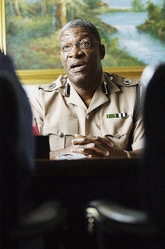Top cop set to shake things up - Acting commissioner goes to bat for more stringent screening
Published: Wednesday | November 11, 2009

Owen Ellington
Shortly after arriving at Jamaica Constabulary Force (JCF) headquarters in St Andrew yesterday, Owen Ellington settled behind his desk in the commissioner's office to start a busy day.
Ellington, 47, temporarily holds arguably the most challenging job in Jamaica.
The 30-year JCF veteran became acting commissioner on November 7, one week after Hardley Lewin resigned after two years as top cop.
Many consider the bespectacled Ellington a shoo-in to become Jamaica's third commissioner in six years.
On Monday, he issued a statement with a list of priorities. It contained long-standing issues which have become asterisks for police commissioners - reducing crime, upholding human rights and ridding the force of corrupt cops.
Urgent issues
They are issues the articulate Ellington says require urgent attention, no matter who is police commissioner.
"It's not about me or any individual, it's about the Jamaica Constabulary Force and a requirement that there be a continuity in the delivery of service," he said. "There can be no gap in how we conduct our business."
How the JCF conducts its business is a hot topic. Recently, Assistant Commissioner of Police Les Green spoke about rampant corruption within its ranks, while Prime Minister Bruce Golding hinted in Parliament that ineffective leadership cost Lewin his job.
According to police statistics, more than 1,200 homicides have been recorded in Jamaica in 2009, the sixth straight year murders have passed the 1,000 mark.
Ellington has a strong crime résumé, having headed the Area Four and St James police divisions, two of the country's most violent regions.
His previous position was in charge of the JCF's operations and crime unit.
He is aware of the impact runaway crime has had on citizens, most of whom are desperate for effective strategies to fight criminality.
Priorities
"What is going to be different is a reordering of priorities, by putting crime containment as number one and the restoration of public safety and confidence as number two, because these are links to the reduction in crime," he explained.
"We also have to accelerate the anti-corruption strategy because we are at what I regard a tipping point, where our best efforts are not going to deliver the kind of results we want if we are saddled by corruption," he added.
There have been multiple arrests of cops in the past three years, ranging from accepting bribes to questionable shootings. Weeding out rogue cops proved a feverish task for previous commissioners Trevor MacMillan, Francis Forbes, Lucius Thomas and Lewin.
Ellington believes a more aggressive vetting process of persons looking to re-enlist in the force, as well as prospective members, can significantly improve the image of the JCF.
"We have a full agreement between the high command and the representative organisations (in the force) for mandatory prescreening, perhaps even polygraphing of members as a precondition for re-enlistment," Ellington said.
"I am looking to mandatory screening and polygraphing of members coming into the organisa-tion, and I will certainly include pre-screening and polygraphing for members considered for promo-tion," he continued.
The Private Sector Organisation of Jamaica (PSOJ) has worked with the police on several anti-crime initiatives. PSOJ President Joseph Matalon said the next commissioner of police has a tough task.
"One of the new commissioner's biggest challenges will be the constraint on government resources. That can affect reform programmes like training and recruitment, which is a problem right now," Matalon told The Gleaner.
Young admirer
The JCF Ellington said he admired as a youngster in rural Glengoffe, St Catherine, bears little resemblance to the current force.
The third of eight children born to a builder/farmer father and a mother who was a homemaker, Ellington said he always wanted to be a police officer.
"What attracted me was the cleanliness of the policemen in my district. They were clean, neatly dressed," he recalled.
"I liked the idea of being in uniform."
Along with two of his friends, Ellington sat the test to enter the force as a 16-year-old in his school uniform. Two years later, he was accepted.
Ellington has also seen the JCF's transformation from an organisation rewarding journeymen to promoting younger members, male and female. He is one of the beneficiaries of that new order, moving rapidly up the ranks during the last decade.
Ellington holds a master's degree in national security and strategic studies from the University of the West Indies. A self-proclaimed bookworm, he says he relaxes to African music, with legendary South African trumpeter Hugh Masekela and Ladysmith Black Mambazo among his favourites.
There will be little time for dancing if Owen Ellington is appointed police commissioner.
In the interim, he is seeking to restore public confidence in the JCF's fight against crime.
"What used to be regarded as victimless crimes, like peddling ganja and harbouring criminals, are making communities unsafe," he said. "These things are not only matters for the police, citizens need to understand that they are not safe when they embrace criminality."











